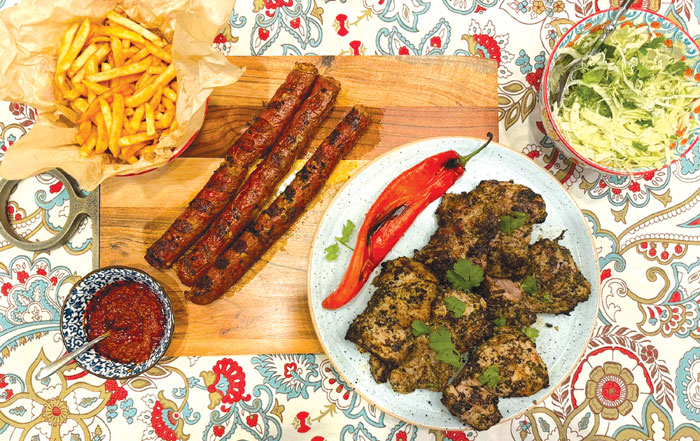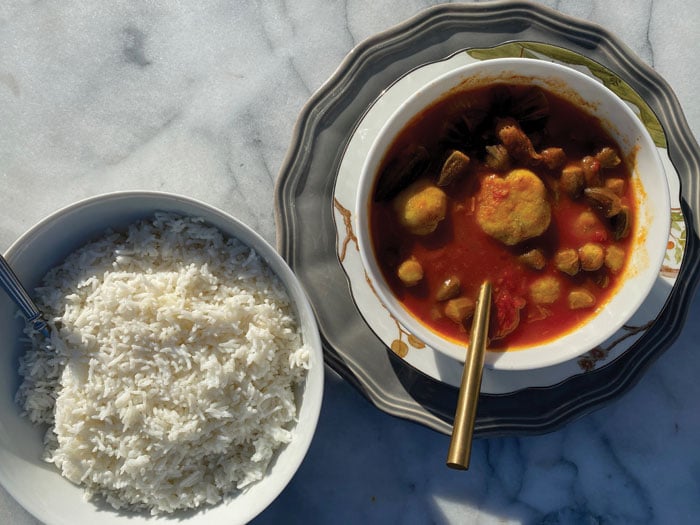Maman’s Precious Recipe: Potato Pastelle
Our absolute favorite dish that my mother would make for Friday nights was her one and only meat and potato Pastelle

What began three years ago as a dare from Jewish Journal editor David Suissa to Rachel has turned into this incredible Sephardic Spice Girls project. In a labor of love, we have recorded family recipes and community recipes, we have written about our family histories, ancient Sephardic communities, our lives and our travels.
We are so honored to be able to write this column and we are so grateful to all the readers who give us so much positive feedback every week. People have written to us from all over the world. Some tell us how happy they are to read our stories and to see recipes that are so close to the ones that they grew up with. Many have written that they are in tears when they see recipes that their mothers and grandmothers made, recipes they thought they’d never see again.
This week, Rachel tells us the story of Maman’s Pastelle.
—Sharon
People often ask Sharon and me how we come up with the recipes. For me, the recipes are the easy part. We emigrated from Casablanca, Morocco just before my eighth birthday. We left our family, our friends and community behind, so I stuck to my mother like glue. I was with her in the kitchen, watching, helping, tasting, remembering.
My parents wanted my brothers and I to adjust to living in a new country and they wanted us to be as American as possible. Weeknight dinners became an adventure in Americana. My mother cooked chicken pot pie, macaroni and cheese, corn dogs and sloppy Joes. We ate peanut butter and jelly sandwiches. We had all-American barbecues with burgers and hot dogs.
But for Shabbat, Maman always brought us back to our roots. There was always a beautiful table set with her fine china, her sterling silver cutlery and white linens. There would be salade cuite (matbucha), beet salad (my favorite), cooked carrot salad with Swiss chard, fresh orange salad with cured black olives, a roasted pepper salad and more. She made flavorful soups. There was always a fish course, sometimes a spicy Moroccan fish with preserved lemon or a Dover sole in a smooth, creamy lemon and egg sauce. The main course might be a stuffed boneless chicken or a stew with tender meat and briny olives or bright vegetables stuffed with ground beef, rice and herbs.
For the Jewish holidays, there would be couscous with all the trimmings. But our absolute favorite dish that my mother would make for Friday nights was her one and only meat and potato Pastelle. Call it a Moroccan Shepherds Pie. This recipe calls for the same sautéed onions, ground beef and mashed potatoes, but instead of the usual paprika and tomato sauce, Pastelle is seasoned with bay leaf, nutmeg, cumin, coriander and a zesty squeeze of fresh lemon juice.
My mother made it with layers of mashed potato, ground beef, thinly sliced hard boiled egg and topped it with pillows of fluffy mashed potato. Then she would take a fork and etch a crisscross design on top.
I was curious to see if other Moroccans made Pastelle the way my mother made it. My cousins have only ever eaten it with hard-boiled eggs. I reached out to David Suissa to ask him if his mother makes it with hard boiled eggs and he and his lovely sister Sandra concurred that she didn’t include it in her Pastelle.
So I pulled out all my Moroccan cookbooks to find out the real story. The French Moroccan authors, such as Danielle Renov in “Peas Love & Carrots” and Sina Mizrahi in “Good Food,” write their recipe without hardboiled eggs. The Spanish Moroccan authors, like Ana Bensadon and Viviane and Nina Moryoussef made pastel de papa with eggs.
This made me smile. Once again, the Jewish community within the same country had different ways of cooking the same dish, depending on the French or Spanish influences in their region. I searched online and found a flurry of different Pastelle recipes from France to Spain, from Argentina to Peru. Some included grated carrots, some tomato sauce, some were made with meat and some with cheese. Every recipe had its own twist. Food truly has the power to connect us, from around the world, in so many ways.
It is the connection that my mother created in my family that I try to recreate every Friday night, every Jewish holiday. I will continue to honor her memory by making her recipes and recording them for future generations.
It is the connection that my mother created in my family that I try to recreate every Friday night, every Jewish holiday. I will continue to honor her memory by making her recipes and recording them for future generations.
We truly hope you are enjoying the journey.
—Rachel
Pastelle (Moroccan Potato Pie)
Meat
2 tablespoons olive oil
1 onion, finely chopped
1 lb ground beef
1/8 teaspoon nutmeg
1 teaspoon salt
½ teaspoon white pepper
1 teaspoon cumin
1 teaspoon ground coriander
1 bay leaf
1 cup water
1 lemon, juiced
½ cup chopped Italian parsley
4 large eggs, boiled, peeled and sliced
Mashed Potatoes
2 tablespoons kosher salt for water to boil potatoes
10-12 large golden or russet potatoes, peeled
1 tablespoon turmeric
salt, to taste
½ teaspoon white pepper
2 egg yolks
1 tablespoon olive oil
1 egg, beaten (for egg wash)
In a deep pan, over medium heat, warm olive oil. Add chopped onion and sauté until starts to soften.
Add the ground beef and sauté. Use a wooden spoon to break up the meat into small pieces.
Add the spices and bay leaf and sauté for a few minutes.
Add water, then cover the pan and simmer for 30 minutes.
When the water has evaporated, add the parsley and cook for an additional 5 minutes.
Stir in the lemon juice, then remove from heat.
Drain any excess liquid and set aside.
Preheat oven to 350°F.
Fill a large pot halfway with water, add kosher salt and bring to a boil.
Add the turmeric and potatoes, then cover the pot, and simmer over low heat for 45 minutes until fork tender.
Drain the potatoes, reserving ½ cup of liquid.
Mash the potatoes and slowly add the reserved liquid.
Salt to taste, then add pepper and egg yolks. Separate into two portions.
Use olive oil to grease the inside of a large oven safe dish.
Spoon one half of the potatoes on the bottom of the dish.
Spoon the meat over the first layer, making sure not to compress the potato layer.
Place the egg slices evenly over the meat.
Lightly spread the remaining potato mixture over the meat and eggs. Use a fork to etch a diagonal pattern in the potatoes.
Brush the egg wash over the top layer of potatoes and bake for 45-60 minutes, until the top of the pie turns golden brown.
Rachel Sheff and Sharon Gomperts have been friends since high school. They love cooking and sharing recipes. They have collaborated on Sephardic Educational Center projects and community cooking classes. Follow them on Instagram @sephardicspicegirls and on Facebook at Sephardic Spice SEC Food.






